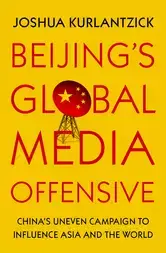Joshua Kurlantzick is senior fellow for Southeast Asia at the Council on Foreign Relations (CFR). He is the author, most recently, of Beijing's Global Media Offensive: China's Uneven Campaign To Influence Asia and the World. Kurlantzick was previously a visiting scholar at the Carnegie Endowment for International Peace, where he studied Southeast Asian politics and economics and China's relations with Southeast Asia, including Chinese investment, aid, and diplomacy. Previously, he was a fellow at the University of Southern California Center on Public Diplomacy and a fellow at the Pacific Council on International Policy. He is currently focused on China's approach to global diplomacy and the world, China’s relations with Southeast Asia, and China’s approach to soft and sharp power, including state-backed media and information efforts and other components of soft and sharp power. He is also working on issues related to the rise of global populism and populism in Asia, and is also working on a new project on the return of coups and the militarization of politics in countries around the world. He continues to work on issues related to Southeast Asia as well, and issues related to individual states in Southeast Asia.
Kurlantzick has also served as a columnist for Time, a correspondent for The Economist based in Bangkok, a special correspondent for the New Republic, a senior correspondent for the American Prospect, and a contributing writer for Mother Jones. He also serves on the editorial board of Current History.
He is the winner of the Luce Scholarship for journalism in Asia and was selected as a finalist for the Osborn Elliott Prize for Excellence in Journalism in Asia. His first book, Charm Offensive: How China’s Soft Power Is Transforming the World, was nominated for CFR’s 2008 Arthur Ross Book Award. He is also the author of A Great Place to Have a War: America in Laos and the Birth of a Military CIA, State Capitalism: How the Return of Statism is Transforming the World, and Democracy in Retreat: The Revolt of the Middle Class and the Worldwide Decline in Representative Government.
Kurlantzick received his BA in political science from Haverford College.
 Online Store
Online Store

